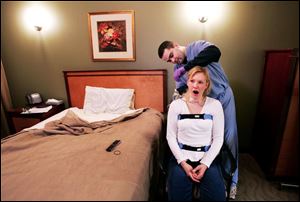
Hospitals, clinics awaken to sleep's business potential
3/16/2007
Electrodes are fitted to a patient at a sleep-study clinic operated by a St. Paul, Minn., hospital.
MINNEAPOLIS - A good night's sleep has become big business.
Sleep centers are popping up to address sleep problems ranging from the plain old lack of nightly rest to complex disorders that can raise the risk of hypertension and stroke.
Nationwide, there are now 1,106 accredited sleep centers, up from 374 a decade ago.
"Sleep disorders are incredibly prevalent, and most are treatable," said Dr. Mark Mahowald, a neurologist and a pioneer in sleep medicine at Hennepin County Medical Center in Minneapolis.
Consider Fred Fox. For months, his wife urged him to see a doctor. He not only snored, she said, he regularly seemed to stop breathing at night. Finally, Mr. Fox went to a hospital sleep center in Maplewood, Minn.
In a hotel-like room, technicians attached wires to his head, chest, and abdomen. Lines zigzagged across a computer screen - mapping brain waves, blood oxygen levels, chest and eye movements - while he slept.
The results were eye-open-ing. Mr. Fox learned that he stopped breathing up to 70 times an hour, sending the oxygen levels in his blood plummeting. When he left the next morning, he was carrying a face mask and a bedside device the size of a clock radio to help push air into his windpipe.
"I can't imagine wearing this mask every night," said Mr. Fox, 53. "But when I see how many critical symptoms I have, I'm gonna do it."
Northwest Ohio has about 15 facilities accredited by the American Academy of Sleep Medicine either as specialty laboratories for sleep-related breathing disorders or full-service sleep disorders centers.
The Toledo area's newest, Sleep Disorders Center of Perrysburg, opened about 1 1/2 years ago. Only about 10 percent of sleep apnea cases have been diagnosed nationwide, so there is plenty of room in the sleep center market, said Noelle Hartford, clinical coordinator of the Perrysburg center.
"It is definitely a growing business," she said. "It has a lot of potential."
Doctors are becoming more aware of health risks associated with fragmented sleep and apnea, and so are patients, said Joseph Schaffer, president of Toledo's Sleep Network Inc., which includes the Regional Center for Sleep Medicine near Westfield Franklin Park.
Sleep medicine has exploded primarily for two reasons.
The first is the 24-hour culture that pressures people to fit ever more work and play into each day. What's more, sleepiness often is seen as a sign of weakness and sleep deprivation as proof of how hard someone is working.
The second reason is the growing body of medical knowledge on sleep. Doctors now know, for example, that sleep apnea can increase the risk of heart failure, high blood pressure, stroke and diabetes.
Not all disorders require a sleep study - insomnia doesn't, for example - but they are the fastest-growing part of the sleep business.
How fast? Three years ago, Regions Hospital in St. Paul opened two beds for sleep studies, then went to four and then six. Even then, there was a 55-day wait to get in, said Gretchen Leiterman, a vice president at Regions. When the hospital opened its Maplewood center last summer with 10 beds, the wait time was cut to 12 to 14 days.
A diagnosis doesn't come cheap. At North Memorial Medical Center in Robbinsdale, Minn., charges for an overnight sleep study start at $2,400, but insurers often negotiate discounts. Medicare typically pays about $800, and a private insurer might pay as much as $1,500, said Bob Bryant, supervisor of North Memorial's sleep center.